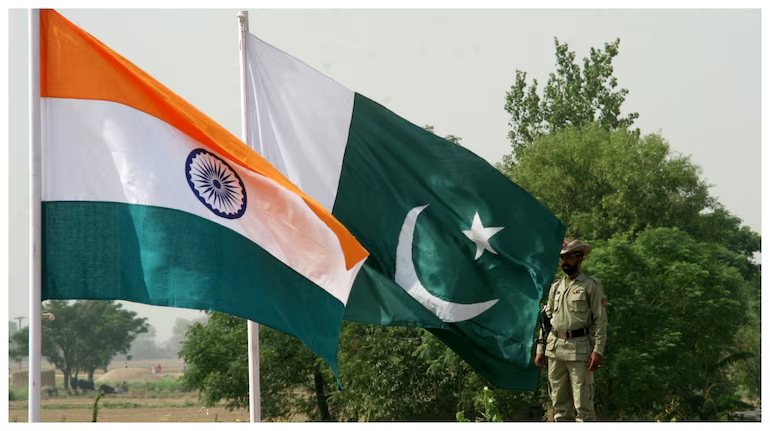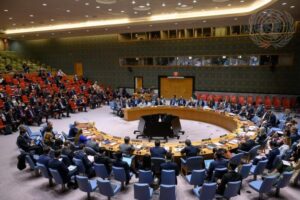
Pakistan is held accountable by the UN Security Council for the alleged Pahalgam attack. 2025

In a closed-door meeting, the United Nations Security Council (UNSC) took a strong stand against the recent terror attack in Pahalgam and posed difficult questions for Pakistan. Numerous countries have demanded accountability and justice in response to the attack, which killed 26 civilians.
Pakistan’s Difficult Questions for the UNSC
UNSC members questioned whether Lashkar-e-Taiba (LeT), a banned terrorist group with close ties to Pakistan, was involved in the attack during the informal session, rejecting Pakistan’s “false flag” claim. The council underlined the need for accountability while strongly denouncing the terrorist act.
The seriousness of the attack was brought to light by some members who expressed particular concerns about the targeting of tourists because of their religious beliefs. Tensions in the area were further heightened by Pakistan’s recent missile tests and nuclear rhetoric, which were cited as escalating factors.
Pakistan’s Attempts to Take the Problem Globally Fail
In an attempt to obtain diplomatic leverage, Pakistan had attempted to internationalise the matter. UNSC members, however, essentially rejected Islamabad’s efforts to change the narrative by advising Pakistan to settle the issue bilaterally with India.
Another setback came when India decided to ban all aircraft registered in Pakistan from using its airspace, forcing Lufthansa Airlines to halt operations through Pakistani airspace. Additionally, since India put the Indus Water Treaty on hold after the attack, water flows in the Chenab River—a vital resource for Pakistan’s irrigation system—have drastically decreased.

The UNSC’s Reaction and Pakistan’s Responsibility
India provided the UNSC with evidence after the attack that connected the attackers to militant organisations based in Pakistan. Digital footprints, forensic analysis, and intelligence intercepts were among the evidence that suggested Pakistan’s Inter-Services Intelligence (ISI) agency was involved in the attack’s planning. During its behind-closed-door discussions, the UNSC urged Pakistan to stop supporting cross-border terrorism and to act immediately against those responsible. The Council underlined that Pakistan must eliminate terrorist infrastructure on its soil and stop attacks against its neighbours.
However, Pakistan has demanded an impartial international investigation and denied any role in the attack. In an effort to damage its reputation internationally, the Pakistani government has characterised the accusations as politically motivated and without merit. Pakistan’s representatives at the UNSC voiced concerns about the growing Islamophobia in the area and reaffirmed their commitment to fighting terrorism.
India
Military and Diplomatic Escalations
India has responded to the attack by punishing Pakistan in a number of ways. The Indian government shut down the primary border crossing between Pakistan and India, suspended the Indus Waters Treaty, and expelled Pakistani diplomats. Furthermore, India has revoked all previously granted visas and prohibited all Pakistani nationals from travelling under the South Asian Association for Regional Cooperation (SAARC) Visa Exemption Scheme. With heightened security deployments along the Line of Control (LoC), the Indian military has also been put on high alert.
In response, Pakistan has closed its airspace to Indian aircraft, suspended the Simla Agreement, and restricted trade. In recent days, the Pakistani military has demonstrated its ability to defend itself against any perceived aggression by testing missiles. The situation has gotten worse as a result of cross-border clashes between the two nations.
Global Responses
The growing tensions between India and Pakistan have caused great concern among the international community. António Guterres, the UN secretary-general, has urged both countries to exercise the utmost restraint and to communicate in order to settle their differences amicably. The United States, Russia, Iran, and a number of European countries have all denounced the attack and demanded an impartial inquiry into the event. Others have underlined the significance of tackling the underlying causes of terrorism and fostering regional stability, while some nations have voiced support for India’s right to self-defence.

International censure and demands for justice
Antonio Guterres, the UN secretary-general, denounced the attack, saying that it is unacceptable to target civilians and that those responsible must be held accountable using legal and legitimate channels.
India has announced a number of punitive measures against Pakistan, including the suspension of the Indus Waters Treaty, the closure of the Attari border crossing, and the downgrading of diplomatic ties, and has pledged to take harsh action against those involved.
The Path Ahead
Pakistan is coming under more scrutiny for its alleged ties to terrorist organisations as a result of the UNSC’s firm stance and growing international pressure. To stop further escalation, the international community is still calling for accountability, transparency, and swift action.
The world closely monitors Pakistan’s response to the UNSC’s challenging questions and whether significant action will be taken to address the issues brought up as tensions rise.
DPV NATION





